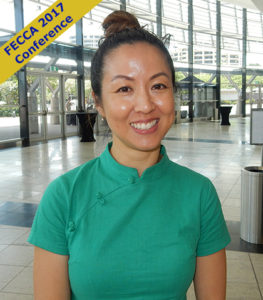The Good Girl of Chinatown
 Jenevieve Chang’s story delves into the very essence of what it means to be part of an ethnic diaspora.
Jenevieve Chang’s story delves into the very essence of what it means to be part of an ethnic diaspora.
It’s the story of generational gulfs and the effects of the modern world colliding with long held traditions.
Jenevieve’s grandparents were forced to flee mainland China during the communist takeover.
Like her father, Jenevieve was born in Taiwan, but the family moved to Australia when she was four years old.
Forced to play the role of the ‘good girl’ all her young life – obedient, hard-working, and excelling at school – Jenevieve rebelled by running away to train as a dancer in London.
After falling in love and marrying a man of Afro-Caribbean heritage, she moved to Shanghai and found work in the city’s burgeoning burlesque scene.
She hoped to recognise the Shanghai of her grandparents’ stories, but the China she found was one of rampant though hidden hedonism and a life lived between two cultures.
Told in Jenevieve’s memoir ‘The Good Girl of Chinatown’ the story ultimately weaves multiple narratives across three generations and continents.
After her marriage broke down, Jenevieve found herself penniless and lost.
She remakes herself as one of the Chinatown Dolls, the most sought-after showgirls in town.
But with memories of the past pressing in, Jenevieve finds herself more lost than ever.
Struggling with her identity craziness that is Shanghai, she realises that she’s following in the footsteps of her parents and her grandparents in unexpected ways and must decide between the hedonism of current life or possible redemption through facing up to her past.
Eventually Jenevieve returns to Australia and reconciles with her parents. She has written her memoir, is planning a new book and is working as an actor and dancer.
“I think my story is about the boundaries we choose to cross and the roles we choose to play. And it is a story about family and the ways we try – but sometimes fail – to be good for them,” she told the recent Federation of Ethnic Communities’ Councils of Australia (FECCA) conference in Darwin.
“It’s about how we are shaped by family and by culture and traditions but also about how we ultimately have to find our own pathways,” she said.
Jenevieve shared a passage from her book with the conference audience:
SHANGHAI, 2010
‘I wake up naked and alone. Last night’s dress is a pool of tarnished glitter at the foot of the bed. My brain feels like it’s had a saw run over it, jagged teeth scraping across soft grey matter.
I lift my eyes from a make-up smeared pillow to meet the ambivalent gaze of my adopted street cat, Caspian. If only cats could talk. I wonder how I got home. Fragments of the last twelve hours come to me: my climactic stage turn, a round of champagne cocktails, a sea of hungry eyes . . . and then the canopy of unconsciousness from which I am now painfully emerging.
The wall clock reads 9 a.m. I have to be at work in an hour! I think through a foggy cloud. I summon shreds of a dancer’s discipline to pull myself out of bed. Smoggy light spins like a disco ball as the honks of traffic float up twenty-one floors of glass and concrete. I try to stop my legs from buckling as my feet touch the floor.’
Laurie Nowell
AMES Australia Senior Journalist












